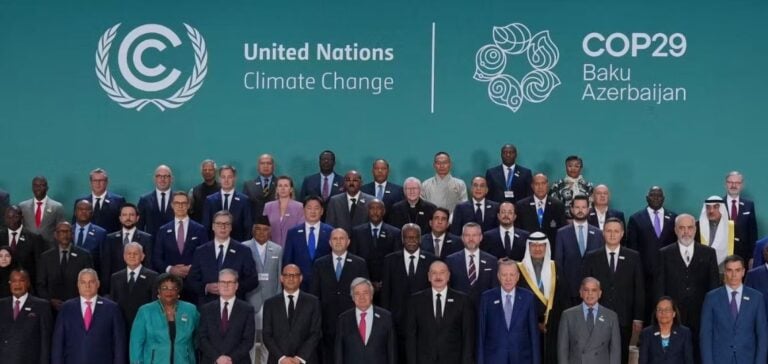The COP29, held in Baku, Azerbaijan, marked a new chapter in international climate negotiations. While expectations were high, especially from developing countries, the final agreement sparked a wave of criticism. The promise of an annual $300 billion by 2035, although ambitious on paper, is seen as inadequate to address the climate emergency.
**A Legacy of Broken Promises**
This financial commitment follows a pledge made during COP15 in Copenhagen in 2009, where wealthy nations promised to mobilize $100 billion annually by 2020. However, this threshold has only recently been partially met, fueling mistrust among developing countries. These nations are now demanding guarantees that new commitments will be honored and scaled to the growing climate challenges.
Ali Mohamed, representing the African Group, denounced the funding as “too little, too late, and too vague,” while Chandni Raina, an Indian representative, labeled the amount as “pathetically insufficient.” These criticisms reflect a sentiment widely shared among the most vulnerable states, particularly small island nations facing accelerated sea-level rise and extreme weather events.
Barriers to Energy Transition
One of the key issues discussed during this COP was the energy transition. While developing countries demand financial resources to adopt low-carbon energy, wealthy nations remain divided on how to fund this transition. The slow progress in discussions on phasing out fossil fuels also drew criticism.
A text aimed at strengthening commitments to abandon oil, coal, and gas failed to gain approval. For Marina Silva, Brazil’s Environment Minister, this stalemate reflects a persistent divide between major industrial powers and developing nations.
Allegations of proximity between Azerbaijan, the host of COP29, and fossil fuel-producing nations further complicated negotiations. Diplomatic tensions, particularly with European delegations, marked the conference’s final hours.
The Weight of Diplomatic Tensions
The organization of COP29 in Baku, seen as a prestige project for Azerbaijan, was marred by controversies. The arrest of environmental activists, political tensions with France, and allegations of harassment against U.S. parliamentarians cast a shadow over the event.
These incidents highlighted the challenges of hosting a conference of this scale in a country accused of collusion with oil interests. Germany, for instance, criticized the lack of impartiality in the discussions. Several delegations even walked out of a meeting in protest.
An Uncertain Future for Climate Financing
The $300 billion pledged will need to be mobilized in a context of fiscal tightening and competing priorities for donor countries. European Commission President Ursula von der Leyen praised the agreement as a “new era” of climate cooperation while acknowledging the challenges ahead.
According to NGOs like the Climate Action Network (CAN), this financial commitment, although significant, still falls far short of estimated needs. Experts argue that effective climate action would require funding levels to reach $1 trillion annually.
Toward a Decisive COP30
With COP30 scheduled in Brazil, expectations are turning toward a revival of global climate ambitions. Brazil, under the leadership of Lula da Silva, has pledged to make the event a key step in strengthening climate commitments.
However, the divisions observed in Baku, particularly over the historical responsibility of wealthy nations and short-term commitments, will continue to weigh on negotiations. Developing countries hope COP30 can meet their expectations for financing and concrete actions to mitigate the impacts of climate change.





















